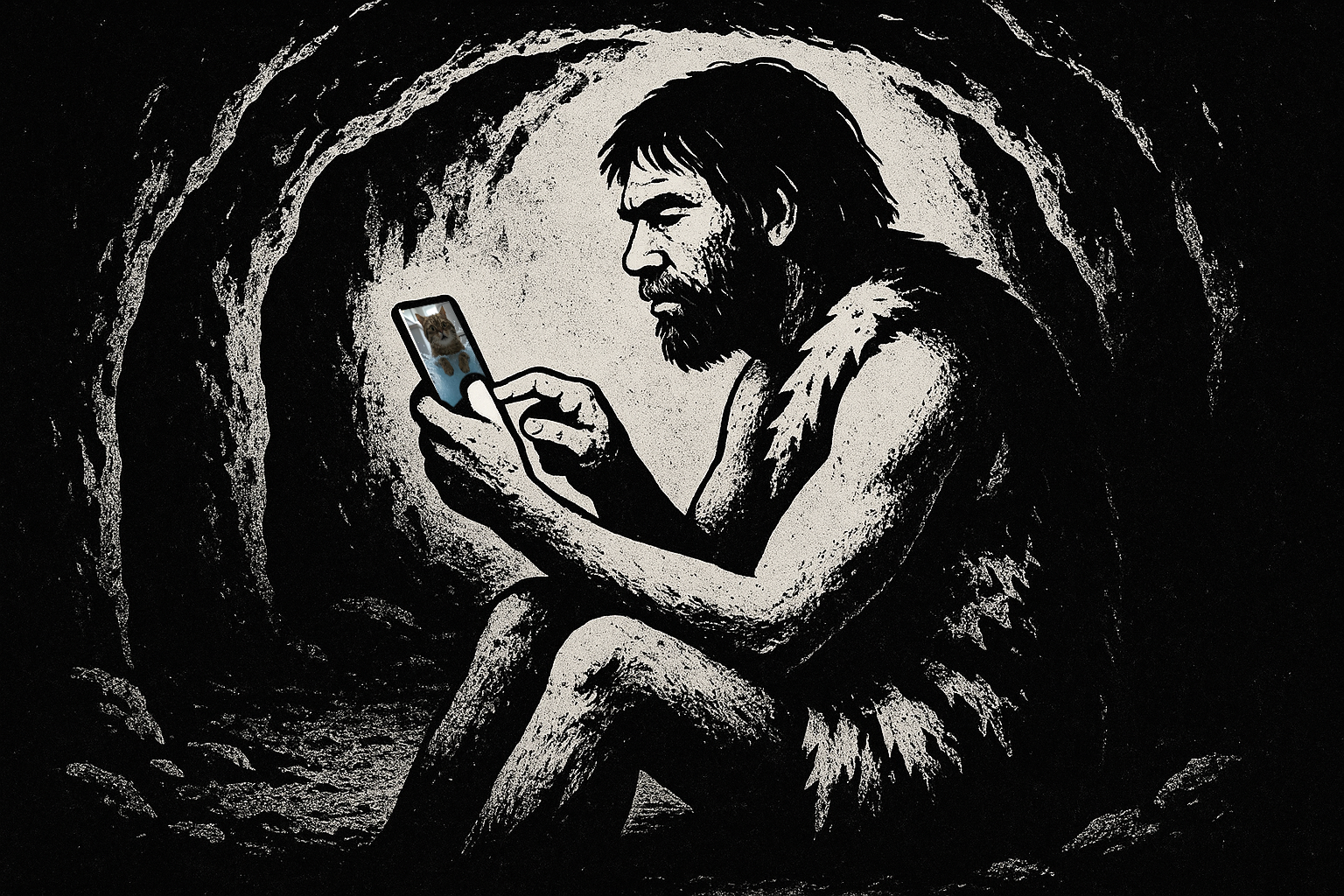Addiction is an Evolutionary Trait
Hear me out. I have a theory that the mechanism behind addiction is actually designed to help us survive. I’m talking about the small dopamine spike that suggests a much larger one is coming in the near future if you keep doing what you’re doing. You can see this in yourself when you’re scrolling. Content moves past and some of it is mildly interesting or funny. This gives you little spikes of dopamine that suggest you might see something REALLY interesting or funny if you scroll long enough. And when you eventually do, you get the big spike. Ahhhhh. But then that feeling of satisfaction fades, and you’re left feeling hungry for more, so you keep scrolling and repeating the process.
You may have noticed that if you feel amazing in your life, it’s really easy to scroll for a short time and put the phone down, or even avoid scrolling entirely. But if you feel really stressed or anxious, it’s much harder to stop scrolling. (Or web surfing, or shopping, or working, or drinking – pick your poison.)
So how did this evolve? I think it’s probably older than our species, but let’s use hunter-gatherers as an example. Every early human had at least one traumatic experience of running out of food and nearly starving to death. This horrible experience made a lasting impression, and they learned to watch for the signs that food was going to become scarce. When they would notice them, their brains would start to decrease their dopamine levels, which is a signal that feels like “Hey! Stop whatever you’re doing and pay attention, because something bad might happen soon. Be vigilant!” The lower the dopamine levels, the greater the concern and feelings of vigilance. Hunger or other bodily distress lowers dopamine even more.
An early human experiencing these low dopamine signals would be highly vigilant, and if they saw something that might lead to food, like an animal track, their brain would give that little spike of dopamine, suggesting that a bigger one might happen in the future if they follow it. Then if they see more tracks or signs of the animal, they get more little spikes, incentivizing them to keep going. When they eventually track down the animal and catch it, they get a massive spike of dopamine – “I did it! I will survive and I can relax now!” The physical exertion combined with the dopamine gives their body a powerful cocktail of neurotransmitters that reward this early human for its hard work and give feelings of relaxation and contentment.
However, because our present-day lives are so different, this mechanism can go haywire. We end up scrolling endlessly, shopping too much, or consuming substances that boost our dopamine directly, instead of tracking footprints until we catch an animal to eat. These activities actually make us less functional and less able to make meaningful changes in our lives.
Crucially, the factor that causes us to get stuck in these addictive cycles is the modern day equivalent of feeling like we’re running out of food: worrying about money, stressing at our job, concerns about the future, and so forth. This is the actual problem. The more stressed we feel, the more our instinct to find “food” is activated, and the harder it is to avoid activities that spike our dopamine.
So how do we fix this? We can’t get rid of the mechanism itself. But we can address the “running out of food” feelings that trigger the mechanism. These feelings actually come from survival trauma, much of it inherited from ancestors who actually did run out of food. If you can heal the trauma, your stress and anxiety will decrease, and your brain will stop decreasing your dopamine. A higher baseline of dopamine results in feeling more stable and secure, and makes it much easier to avoid addictive behaviors.
I use a novel modality called Peak States Therapy, which can heal generational, biographical, and prenatal trauma. If this sounds weird to you, don’t worry, you don’t actually need to believe it in order for it to work. I have skeptical clients who tell me after every session that they are surprised and confused that it worked for them yet again.
Using this method, I can help resolve this and many other issues, resulting in a clear mind, a stable emotional baseline, and the ability to engage with life from a place of choice rather than compulsion. When your brain no longer believes you’re in a constant state of emergency, it stops chasing relief and starts creating satisfaction. Addiction, at its core, is a survival mechanism that’s been hijacked by modern life. But when the trauma that feeds it is healed, you’re no longer just surviving; you’re finally free to thrive.
If this sounds interesting to you, send me a message!
